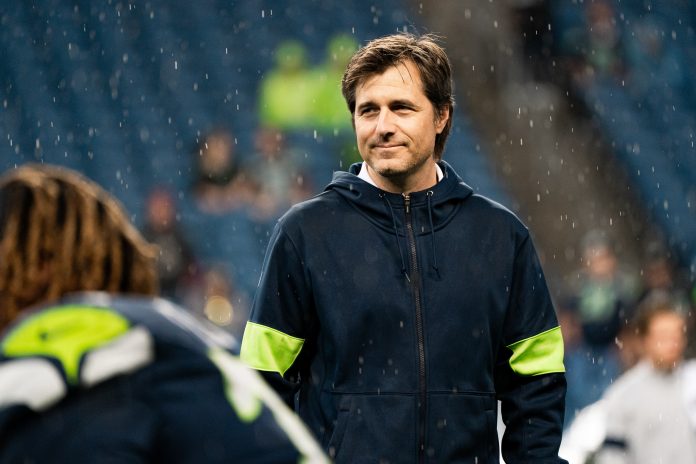
Michael Gervais, and The First Rule of Mastery
EL SEGUNDO, California — In May of 2019, Michael Gervais touched a nerve. Quite a few of them, actually. For 12 months, though, he just didn’t know it, not to the extent that the editors at the Harvard Business Review did.
In his first contribution to the Harvard Business Review, Gervais, one of the most well-known sports psychologists in the world, wrote a piece titled How to Stop Worrying About What Other People Think of You.
“If you want to be your best and perform at a high level, fear of people’s opinions may be holding you back,” he wrote as his opening sentence. It’s a concept that Gervais had espoused many times on his popular podcast, Finding Mastery, shortening the fear of people’s opinions into an acronym, FOPO, an easy-to-remember spin-off to the more well-known FOMO. But the story in the Harvard Business Review exposed readers who may not have been familiar with Gervais and his work to the concept, and for 12 consecutive months after the article’s publication, it was the most downloaded piece on the site.
“It’s not just me. This is really about something I grew up with, something I was overwhelmed by, which is the fear of others opinions,” Gervais said. “But when I was working with the best in the world, it kept showing up as well. There was no name for it. It was ‘I don’t want to let people down, I don’t want to look stupid, going for it is hard for A, B and C reasons.’ We are social beings. We are biologically wired to fit in, so belonging is safety, being pushed out of the belonging is very, very dangerous to our existence if you will. Those intrepid, elite performers who are going for it are going out on the edge.”
He should know. Gervais has worked with individuals and teams in virtually every high-stakes environment there is. He has coached men who have broken skydiving records as well as the CEO at Google. He has been on the sidelines of a Super Bowl-winning Seattle Seahawks team and on the sand with Misty May-Treanor and Kerri Walsh Jennings as they reeled off gold medal after gold medal, just as he was there when Walsh Jennings had to overcome perhaps her biggest obstacle to date: losing in the semifinals of the 2016 Rio Olympic Games and bouncing back to win bronze with April Ross. On his podcast, he has examined the inner workings of a Navy SEAL and ultramarathoner in David Goggins, an F1 dynasty builder in Toto Wolff, a World Cup winner in Carli Lloyd, and a big wave surfer in Ian Walsh, among others in a long and lengthy and extraordinary list.
A common thread, among many, of those high-performance men and women who may, at times, seem as relatable as aliens, as sure of themselves as the sunrise?
They feel that same nagging fear we all do: What is everyone else thinking of me?
“I’m not interested in the medals. It’s cool, winning is awesome for a lot of reasons. It pays bills, you get more time to do the thing, you’re not pushed out the back if you underperform. The thing that I love is, most of the time we’re enamored by the excellence of something or the podium celebration, but behind the scenes, the athletes on the path to mastery have made a fundamental commitment, and that fundamental commitment is to be the very best, to get right to the messy edge, examine who they are in those moments, try to hold on, and what that does, it pushes the edges out even further,” Gervais said. “In that, you get to make some honest decisions and commitments. It’s a fundamental decision and an honest commitment that is part of the path to mastery.”
This past fall, Gervais published a guide to navigating the path to mastery, an extended, flushed-out version of the story he wrote for the Harvard Business Review: The First Rule of Mastery: Stop Worrying About What Other People Think of You.
Think that rule may not apply to you, as Tri Bourne initially did? Think again.
“I remember when I first saw the title of your book it kind of felt — this might be the wrong word — but surface for you,” Bourne told Gervais on SANDCAST: Beach Volleyball with Tri Bourne and Travis Mewhirter. “Because I’m like ‘Oh, this guy knows everything, he’s so deep into this mastery path. And I was like ‘Fear of other people’s opinions? I feel like that’s not that big of a problem for me.’ And so I wasn’t as excited as I thought I would be about reading it, but as I dove in I was like ‘Oh, I get it.’ Now I’m convinced, I’m like ‘Holy shit, this is definitely present all the time.’ ”
Bourne is, of course, not alone. Throughout the book, Gervais weaves in stories of some of the most recognized men and women throughout human history, all of whom suffered from, in some way or another, the crippling weight of the perceived opinions of what others may or may not think of them. Better yet: He provides the way through, a map to navigate the chummed-up waters of social media, where opinions are ubiquitous and seemingly personal. And if it feels, as Bourne said, a bit surface, there’s a reason why Olympians Walsh Jennings, Apolo Ahno, and Julie Foudy wrote effusive praise for the book. There’s a reason why Melissa Humana-Paredes has it in her hands, as do a number of other beach volleyball players, such as Molly Turner and Geena Urango: It touches a nerve, in all of the ways a book should.
“If we’re not careful, the brain will win, but to live the good life, that part of the brain cannot run the whole system,” Gervais said. “The good life has to do with some freedom and some joy and some sense of being you at the very best at the risk of looking stupid, falling down, letting people down, blowing it, failure, mistakes. We say often in business and sport that failure is the greatest teacher: fail fast, fail forward, failure is the greatest teacher, learn from your mistakes – that’s intellectual. Your brain and your emotional system is saying ‘No no no don’t buy into any of that, because if you keep blowing it, they’re going to look at you a certain way, and if they’re looking at you that way, you’re probably going to get kicked out.’ Our emotions and our biology and our hardwiring if we’re not careful runs the show, and that’s why I want to ring the bell and say your brain doesn’t have to run the whole thing.
“Everyone’s got the physical. Everyone’s got the technical. But the ones who have the mental? Those are the ones who do something special.”
Michael Gervais with the Seattle Seahawks/Finding Mastery photo
The post Michael Gervais, and The First Rule of Mastery appeared first on Volleyballmag.com.
Read More Volleyballmag.com Pro Beach


